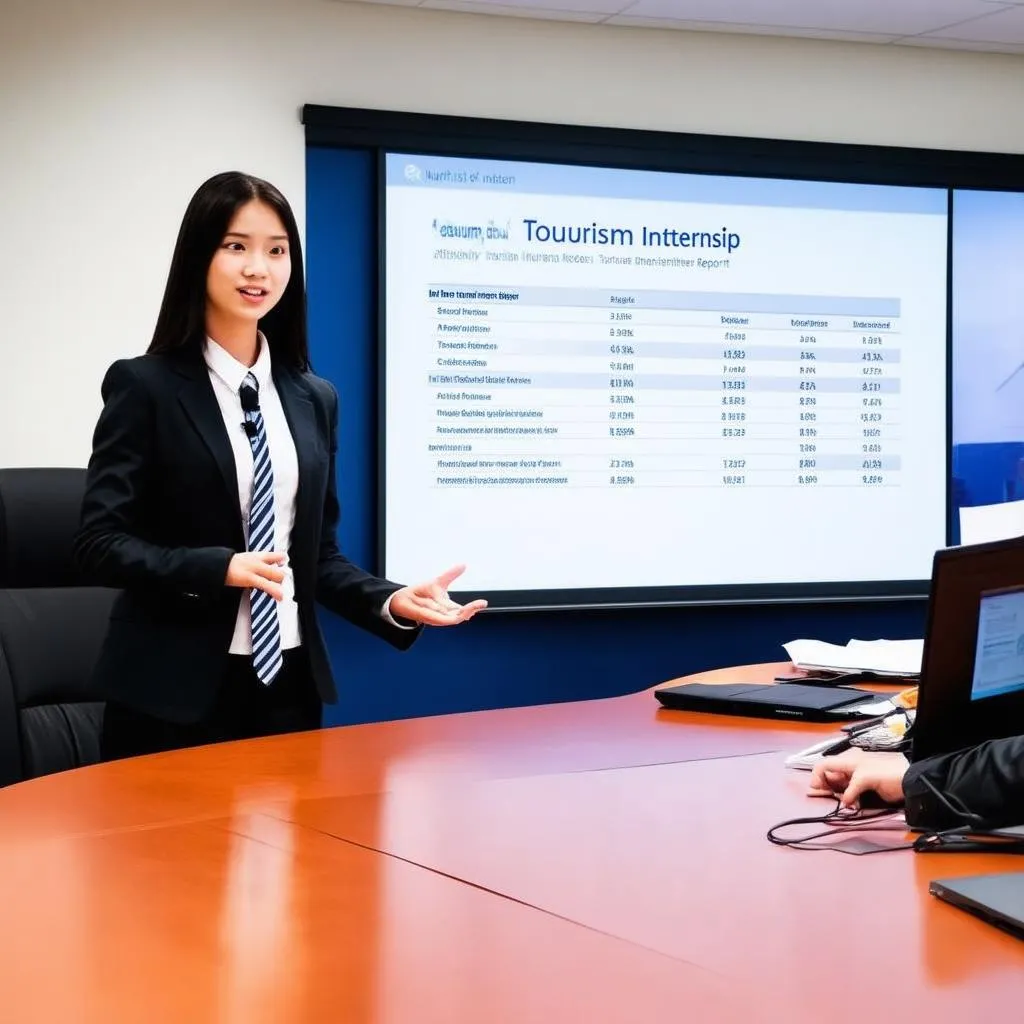“Travel far enough, you meet yourself.” – David Sedaris. This quote beautifully encapsulates the essence of travel, the journey of self-discovery that unfolds as we explore the world around us. But what about capturing these experiences and the valuable lessons learned, especially during a tourism internship? That’s where a compelling internship report comes in.
This guide will equip you with all the tools and knowledge you need to craft an outstanding tourism internship report that showcases your experiences and wows your professors.
Understanding the Importance of Your Tourism Internship Report
Think of your tourism internship report as more than just a course requirement – it’s your passport to showcasing your newfound skills and knowledge to potential employers. It’s a testament to your dedication and a reflection of the invaluable experiences gained while immersed in the dynamic world of tourism.
A well-written report can open doors to exciting job opportunities and set you apart from the competition. It’s your chance to demonstrate:
- Practical skills: From planning itineraries to managing customer inquiries, your report highlights how you’ve applied theoretical knowledge to real-world situations.
- Industry insights: Share your understanding of tourism trends, challenges, and best practices, proving you’re up-to-date on the industry pulse.
- Professional growth: Highlight your problem-solving abilities, communication skills, and adaptability – qualities highly valued in the tourism sector.
Crafting a Captivating Narrative
1. Setting the Scene: Introduction
Begin your report with a captivating introduction that hooks your reader. Consider starting with an anecdote from your internship, a thought-provoking question, or a relevant quote about travel. For example, you could describe the vibrant energy of the Ben Thanh Market in Ho Chi Minh City, Vietnam, during your internship, setting the stage for your report’s focus on Southeast Asian tourism.
2. Showcasing Your Journey: Body Paragraphs
Divide the body of your report into clear sections, each with a descriptive heading (H2) and subheadings (H3) where appropriate. Here’s a possible structure:
## Internship Overview
- ### Company Profile: Briefly describe the organization where you interned, including its mission, services, and target market.
- ### Your Role and Responsibilities: Outline your specific tasks and responsibilities during the internship. Did you lead tours, develop marketing materials, or manage customer relations?
## Key Learnings and Experiences
- ### Applying Theory to Practice: Share specific examples of how your coursework prepared you for the challenges and triumphs of your internship.
- ### Skills Development: Highlight the practical skills you honed, such as customer service, problem-solving, communication, and teamwork.
- ### Industry Insights: Discuss the valuable lessons learned about the tourism industry. This could include trends, challenges, customer expectations, or sustainable tourism practices.
## Challenges and Solutions
- Every internship comes with its own set of obstacles. Describe a challenging situation you encountered and the steps you took to overcome it. This showcases your adaptability and problem-solving skills.
## Recommendations and Reflections
- ### Suggestions for Improvement: Offer constructive feedback to the internship program or the organization. Did you identify areas for growth or enhancement?
- ### Personal Growth: Reflect on how this internship has shaped your career goals and your understanding of the tourism industry.
 Tourism Internship Presentation
Tourism Internship Presentation
Adding Depth: Incorporating LSI Keywords and FAQs
Throughout your report, seamlessly integrate relevant keywords related to tourism. These could include:
- LSI Keywords: Destination management, hospitality industry, travel trends, sustainable tourism, customer experience, cultural exchange, travel technology.
- FAQs: Anticipate questions your readers might have and address them within your report.
Example:
Question: What are the essential skills needed for a successful career in tourism?
Answer: Based on my internship experience, essential skills include strong communication and interpersonal skills, cultural sensitivity, adaptability, problem-solving abilities, and a passion for travel and customer service.
A Touch of Authenticity: Storytelling and Travelcar.edu.vn
Weaving a personal anecdote into your report can make it more engaging and relatable. For instance, share a memorable experience with a tourist while you were interning at a travel agency in Hoi An, Vietnam. Describe the intricate architecture of the Japanese Covered Bridge and the lantern-lit streets, immersing your reader in the magic of the place.
Don’t forget to mention resources like travelcar.edu.vn, which can provide valuable insights and information for aspiring tourism professionals.
Example:
“During my time at the travel agency, I had the opportunity to assist a group of tourists visiting the breathtaking Phong Nha-Ke Bang National Park. Witnessing their awe at the majestic caves and the lush landscapes solidified my belief in the power of travel to connect people with the world’s natural wonders.”
 Phong Nha-Ke Bang National Park
Phong Nha-Ke Bang National Park
Concluding Your Journey: A Memorable Ending
Summarize your key takeaways and reiterate how your internship experience has prepared you for a successful career in tourism. End with a call to action, encouraging readers to explore more about the industry or connect with you.
Example:
“My tourism internship was an invaluable experience that provided me with practical skills, industry knowledge, and a deeper appreciation for the transformative power of travel. I’m eager to apply my learnings to a future career in sustainable tourism development, particularly in Southeast Asia. For those interested in exploring internship opportunities, I highly recommend checking out the resources available at travelcar.edu.vn.”
Final Touches: Proofreading and Formatting
- Proofread carefully: Ensure your report is free of grammatical errors and typos.
- Use clear and concise language: Avoid jargon and overly complex sentence structures.
- Format consistently: Use headings, subheadings, bullet points, and white space to improve readability.
By following these guidelines and infusing your unique experiences and insights, you’ll be well on your way to crafting a tourism internship report that stands out from the crowd.